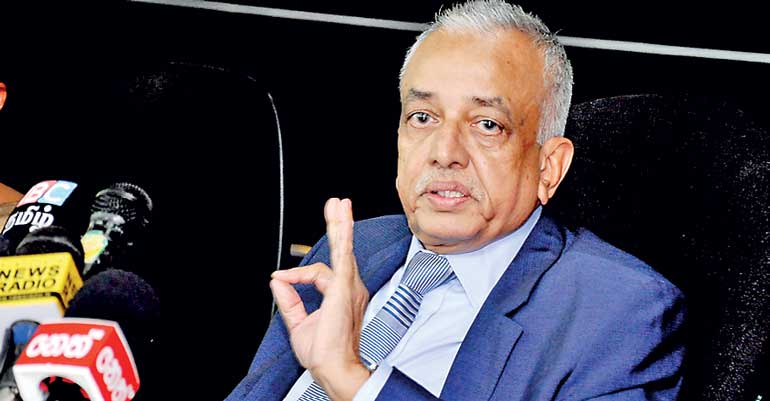Saturday Feb 21, 2026
Saturday Feb 21, 2026
Thursday, 22 December 2016 00:21 - - {{hitsCtrl.values.hits}}
 Development Strategies and International Trade Minister Malik Samarawickrama – Pic by Lasantha Kumara
Development Strategies and International Trade Minister Malik Samarawickrama – Pic by Lasantha Kumara
By Chathuri Dissanayake
Dismissing criticism from the Opposition, the Government yesterday reiterated that the new deal for Hambantota port led by Chinese investments was the best solution beneficial to the country.
“If we don’t convert the loan into investment there is no alternative to handle the debt we have taken. We don’t have the money to invest in the port,” Development Strategies and International Trade Minister Malik Samarawickrama told journalists.
He stressed that the agreement with the China Merchants Port Holdings Company Ltd. (CMPort) to be signed early next month was the only way out of the debt trap.
Out of two bids received for a public-private partnership (PPP), the proposal from China Harbour Engineering Company Ltd. (CHEC), the company which constructed the port, which bid for a 65% stake at $ 750 million, valuing the Hambantota Port at only $ 1.1 billion, while CMPort’s bid offered 1.12 billion for a 80% stake, valuing the entire entity at 1.4 billion, the Minister revealed.
However, the Minister claimed that more investment to the tune of $ 600 million was needed to buy equipment such as cranes for the Hambantota Port to function at optimum capacity.
The deal would also bring in additional investment worth $ 5 billion within four years through the planned industrial zones.
Justifying the move to make the port available on a 99-year lease, Samarawickrama said that the country was not able to absorb the expenses incurred through loan and interest payments and the maintenance of the port especially during the predicted global economic slowdown.
Already 60% of the profits from the Colombo Port are pumped into the Hambantota Port as Minister Arjuna Ranatunga said, so we had to go for this joint venture.
“Next year world GDP is to grow only 2.5%, that too due to development in the Asian region. Global trade growth is usually double the GDP rate but next year it is predicted to be only 0.8% so the shipping industry is predicted to be on the decline,” Samarawickrama said.
According to the Minister, qualified, existing workers will be recruited to the new company through an interview process, while creating new job opportunities as well. The JV also plans to establish a cement plant, LNG plant, oil refinery and dockyard to repair ships within the 1,200 acres of the port. This is in addition to the much discussed industrial zones planned to be set up in Hambantota, Embilipitiya, Moneragala and Matara.
These industrial zones, totalling 15,000 acres, will be established in different locations in three stages. Samarawickrama assured that land to be allocated to the zones would be “90- 95% state land, with only 100-200 private houses” to be relocated.
The first stage of the industrial zones project will be established on 5,000 acres in Hambantota, with plans for establishing about 500-600 factories, Samarawickrama told journalists.
Government yesterday announced plans to table the Development (special provisions) Bill to Parliament in February, while denying claims made by the Joint Opposition (JO) about attempts by the Government to create a “super minister”. Minister Malik Samarawickrama defended the proposal as a move to better facilitate Foreign Direct Investments (FDIs).
“Our intentions are very clear,” he said, defending the move.
The proposed Development (special provisions) Act only seeks to better facilitate investments coming into the country, Development Strategies and International Trade Minister Samarawickrama told reporters yesterday, at a media briefing held at the ministry.
“Last four to five years we have not had much investments coming into the country. Last year total investment only amounted to $ 800 million in the country, when a country like Myanmar attracted $ 6.8 billion investments the same year. Those countries facilitate investors, we are trying to do the same,” he claimed.
The act seeks to establish an agency to facilitate the investment process, where the agency will take over the responsibility of coordinating with relevant ministries.
“At present when the investor comes to BOI, the company then has to go to a host of other ministries, such as Land and Environment. This will help give all facilities under one roof,” he said.
When asked if the proposed agency would duplicate the work of the Board of Investment, which currently deals directly with FDIs, the minister said it can work as the “implementing agency”.
“They will have to figure out a way to work together to complement the work of the agency,” he said.
To address the resistance displayed against the proposal by Provincial Councillors, and clarify to its purpose, Prime Minister Ranil Wickremesinghe has summoned Chief Ministers of all nine provinces for a meeting tomorrow, Samarawickrama said.